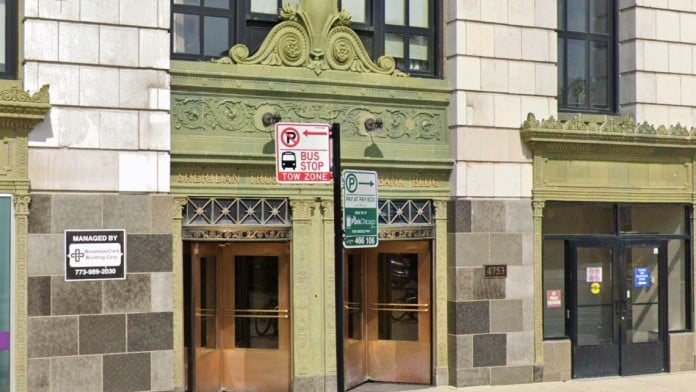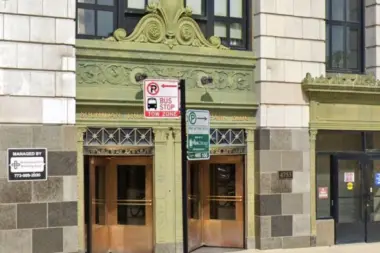Haymarket has truly helped me get back on my feet. I've literally learned how to love myself again and began to live life on life terms. I'm so grateful to the staff who has helped me to gain employment and live my life as a productive citizen in society. I just want to say ...
About Haymarket Center – Uptown
In addition to addiction recovery services. Haymarket Center also provides primary care services, including physicals, screenings and health education. Some other medical services that are available through referral are postpartum care and diagnostic radiology.
Clients who need to start their treatment detox will be monitored 24 hours a day by nurses and physicians. Medical intervention is provided to manage withdrawal symptoms. After a patient has been stabilized, they will be moved to the appropriate level of outpatient or residential care.
One thing I like about Haymarket Center is that it offers several types of programs to help individuals with their specific needs. Maternal Addiction Treatment Hall is a residential program that focuses on helping women address the impact that substance use has on their families and improve their parenting skills.
Children under age five can receive onsite childcare while the mother undergoes individual and group treatment. The Men’s Integrated Treatment Program is designed to help men with co-occurring disorders. It’s overseen by licensed staff members and has access to a psychiatrist. Additional programs at Haymarket Center are the Family Centered Treatment for Fathers, Men’s Rapid Stabilization and the Driving Under the Influence Risk Education Program.
Latest Reviews
Rehab Score
Gallery


Accepted Insurance

Other Forms of Payment
Private insurance refers to any kind of healthcare coverage that isn't from the state or federal government. This includes individual and family plans offered by an employer or purchased from the Insurance Marketplace. Every plan will have different requirements and out of pocket costs so be sure to get the full details before you start treatment.
Self-pay involves paying for treatment out of your own pocket. You can use savings or credit, get a personal loan, or receive help from family and friends to fund your treatment. If you don't have insurance or your insurance plan doesn't cover a specific program, self-pay can help ensure you still get the care you need.
Financial aid can take many forms. Centers may have grants or scholarships available to clients who meet eligibility requirements. Programs that receive SAMHSA grants may have financial aid available for those who need treatment as well. Grants and scholarships can help you pai for treatment without having to repay.
Medicaid is a state based program that helps lower-income individuals and families pay for healthcare. Medicaid covers addiction treatment so those enrolled can use their coverage to pay for rehab. When a program accepts Medicaid the client often pays very little or nothing out of their own pocket.
Addiction Treatments
Levels of Care
OP services are designed to treat the individual’s level of severity and help the individual achieve permanent changes in their substance use and mental health behaviors. Clinically-managed interventions are directed by certified treatment professionals trained in gender-responsive and culturally sensitive treatment services, to address patient’s individualized needs to develop and apply recovery skills in their daily lives. They provide specialized services for Department of Children and Family Services (DCFS) involved individuals.
Detox is the process of removing drugs and/or alcohol from the body, a process that can be lethal if mismanaged. Medical detox is done by licensed medical professionals who monitor vital signs and keep you safe, healthy, and as comfortable as possible as you go through detox and withdrawal. The Medically Monitored Men's Detoxification Program is a 16-bed unit managed 24-Hours a day by medical staff. The Medically Monitored Women's Detoxification Program is a 16-bed unit managed 24-Hours a day by medical staff. The criteria for admission to this adult withdrawal management program are recent use or intoxication. The goal is to safely manage the client’s withdrawal symptoms with the help of medical intervention services (eg Buprenorphine, Librium).
IOP focuses on assisting patients to develop skills to regain stability in their lives and to build a foundation based on recovery within the real world environment. Clinically-managed interventions are directed by certified treatment professionals trained in gender-responsive and culturally sensitive treatment services, to address patient’s individualized needs to develop and apply recovery skills in their daily lives. They provide specialized services for Department of Children and Family Services (DCFS) involved individuals. Hours of operation are Monday through Friday 9 am – 8 pm.
The Men’s Residential Rehab is a 24-bed substance use disorder treatment program. The Women’s Residential Rehab is a 16-bed substance use disorder treatment program. The goal of the program is to provide clinically-managed interventions directed by certified treatment professionals trained in gender responsive and culturally sensitive treatment services, to address client’s individualized needs as well as develop recovery skills. By providing a trauma informed environment clients will learn to overcome barriers to recovery and problems that precipitate relapse. Treatment facilitates successful reintegration into the general community through the following:
At certain points in the recovery process, it's important to have support available 24/7. 24-hour clinical care offers a safe environment in which to recover from drug or alcohol addiction in peace, knowing medical detox and other treatment will happen with professionals on hand.
Intervention services helps family or friends of addicts stage an intervention, which is a meeting in which loved ones share their concerns and attempt to get an addict into treatment. Professional intervention specialists can help loved ones organize, gather, and communicate with an addict. They can guide intervention participants in describing the damage the addict's behavior is causing and that outside help is necessary to address the addiction. The ideal outcome of an intervention is for the addict to go to rehab and get the help they need.
12-step programs are addiction recovery models based on Alcoholics Anonymous (AA). A number of substance abuse programs (including some drug and alcohol rehab centers) use the 12 steps as a basis for treatment. Beginning steps involve admitting powerlessness over the addiction and creating a spiritual basis for recovery. Middle steps including making direct amends to those who've been hurt by the addiction, and the final step is to assist others in addiction recovery in the same way. 12-Step offshoots including Narcotics Anonymous (NA), Cocaine Anonymous (CA), Dual Recovery Anonymous (DRA), Sex and Love Addicts Anonymous (SLAA) and Gamblers Anonymous (GA).
Completing a drug or alcohol rehab program shouldn't spell the end of substance abuse treatment. Aftercare involves making a sustainable plan for recovery, including ongoing support. This can include sober living arrangements like halfway houses, career counseling, and setting a patient up with community programs like Alcoholics Anonymous (AA) or Narcotics Anonymous (NA).
Haymarket Center will provide an 8 bed Therapeutic Community (TC), Recovery Home program for women referred by the Cook County Sheriff’s Women’s Justice Programs (SWJP). The program will extend the continuity of care that Haymarket already provides through its Project COPE Program (Community Outreach Program Enhancement). Project COPE was designed to serve women identified by SWJP and the Cook County Sheriff’s Police Department vice Unit as victims of human trafficking and/or prostitution. The goal of this program is to provide a structured Therapeutic Community (TC), short-term, sober living environment for women with a history of human trafficking and/or prostitution. The women will learn to function independently and begin to lay the groundwork for a successful re-integration into the society.
Treatments
The goal of treatment for alcoholism is abstinence. Those with poor social support, poor motivation, or psychiatric disorders tend to relapse within a few years of treatment. For these people, success is measured by longer periods of abstinence, reduced use of alcohol, better health, and improved social functioning. Recovery and Maintenance are usually based on 12 step programs and AA meetings.
Drug rehab in Illinois is designed to help people recover from addiction to a number of substances. The length of each program and its intensity tend to vary, and the plan of care is based on your individual needs.
Many of those suffering from addiction also suffer from mental or emotional illnesses like schizophrenia, bipolar disorder, depression, or anxiety disorders. Rehab and other substance abuse facilities treating those with a dual diagnosis or co-occurring disorder administer psychiatric treatment to address the person's mental health issue in addition to drug and alcohol rehabilitation.
A combined mental health and substance abuse rehab has the staff and resources available to handle individuals with both mental health and substance abuse issues. It can be challenging to determine where a specific symptom stems from (a mental health issue or an issue related to substance abuse), so mental health and substance abuse professionals are helpful in detangling symptoms and keeping treatment on track.
Opioid rehabs specialize in supporting those recovering from opioid addiction. They treat those suffering from addiction to illegal opioids like heroin, as well as prescription drugs like oxycodone. These centers typically combine both physical as well as mental and emotional support to help stop addiction. Physical support often includes medical detox and subsequent medical support (including medication), and mental support includes in-depth therapy to address the underlying causes of addiction.
Programs
Adult rehab programs include therapies tailored to each client's specific needs, goals, and recovery progress. They are tailored to the specific challenges adult clients may face, including family and work pressures and commitments. From inpatient and residential treatment to various levels of outpatient services, there are many options available. Some facilities also help adults work through co-occurring conditions, like anxiety, that can accompany addiction.
Young adulthood can be an exciting, yet difficult, time of transition. Individuals in their late teens to mid-20s face unique stressors related to school, jobs, families, and social circles, which can lead to a rise in substance use. Rehab centers with dedicated young adult programs will include activities and amenities that cater to this age group, with an emphasis on specialized counseling, peer socialization, and ongoing aftercare.
Clinical Services
Cognitive Behavioral Therapy (CBT) is a therapy modality that focuses on the relationship between one's thoughts, feelings, and behaviors. It is used to establish and allow for healthy responses to thoughts and feelings (instead of unhealthy responses, like using drugs or alcohol). CBT has been proven effective for recovering addicts of all kinds, and is used to strengthen a patient's own self-awareness and ability to self-regulate. CBT allows individuals to monitor their own emotional state, become more adept at communicating with others, and manage stress without needing to engage in substance abuse.
Whether a marriage or other committed relationship, an intimate partnership is one of the most important aspects of a person's life. Drug and alcohol addiction affects both members of a couple in deep and meaningful ways, as does rehab and recovery. Couples therapy and other couples-focused treatment programs are significant parts of exploring triggers of addiction, as well as learning how to build healthy patterns to support ongoing sobriety.
Research clearly demonstrates that recovery is far more successful and sustainable when loved ones like family members participate in rehab and substance abuse treatment. Genetic factors may be at play when it comes to drug and alcohol addiction, as well as mental health issues. Family dynamics often play a critical role in addiction triggers, and if properly educated, family members can be a strong source of support when it comes to rehabilitation.
Group therapy is any therapeutic work that happens in a group (not one-on-one). There are a number of different group therapy modalities, including support groups, experiential therapy, psycho-education, and more. Group therapy involves treatment as well as processing interaction between group members.
In individual therapy, a patient meets one-on-one with a trained psychologist or counselor. Therapy is a pivotal part of effective substance abuse treatment, as it often covers root causes of addiction, including challenges faced by the patient in their social, family, and work/school life.
Life skills trainings involve all the skills a person must have in order to function successfully in the world. Established in the year 2002, The Family Enrichment Center (FEC) is the Employment & Training Program within Haymarket Center. Renamed Ann F. Baum Family Enrichment Center in 2005, the Program provides services to individuals with employment barriers and who also require assistance with launching a career or returning to the workforce as tax paying citizens.
Motivational Interviewing (MI) is a clinical approach to helping people with substance abuse issues and other conditions shift behavior in positive ways. It is more goal-oriented than traditional psychotherapy, as MI counselors directly attempt to get clients to consider making behavioral change (rather than wait for them to come to conclusions themselves). Its primary purpose is to resolve ambivalence and help clients become able to make healthy choices freely.
Nicotine Replacement Therapy (NRT) is a way of getting nicotine into the bloodstream without smoking. It uses products that supply low doses of nicotine to help people stop smoking. The goal of therapy is to cut down on cravings for nicotine and ease the symptoms of nicotine withdrawal.
Nutrition therapy, aka medical nutrition therapy (MNT), is a way of treating physical, emotional, and medical conditions through diet. Specific dietary plans are designed by professional nutritionists or registered dietitians, and patients follow them in order to positively affect their physical and mental health.
Trauma therapy addresses traumatic incidents from a client's past that are likely affecting their present-day experience. Trauma is often one of the primary triggers and potential causes of addiction, and can stem from child sexual abuse, domestic violence, having a parent with a mental illness, losing one or both parents at a young age, teenage or adult sexual assault, or any number of other factors. The purpose of trauma therapy is to allow a patient to process trauma and move through and past it, with the help of trained and compassionate mental health professionals.
Staff & Accreditations
Staff

Dr. Dan Lustig
President & CEO

Kenyatta Cathey
Chief Clinical Officer

Jeffrey Collord
VP of Operations

Robert Edstrom
CFO

Michael Baldinger
Medical Director
Accreditations

The Commission on Accreditation of Rehabilitation Facilities (CARF) is a non-profit organization that specifically accredits rehab organizations. Founded in 1966, CARF's, mission is to help service providers like rehab facilities maintain high standards of care.
CARF Accreditation: Yes
Contact Information
4753 North Broadway
#612
Chicago, IL 60640





